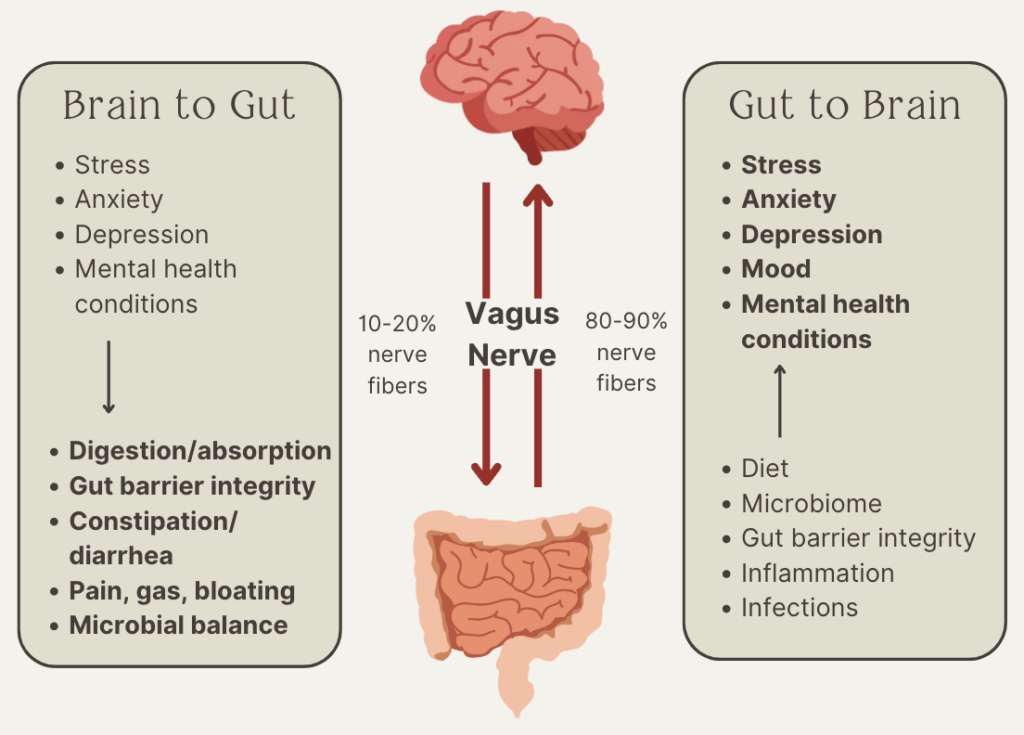The Gut-Brain Connection: How Your Digestive Health Affects Your Mood and Stress
Have you ever noticed how the thought of food can make you feel hungry, or how stress can give you butterflies in your stomach? It’s not just a coincidence. It is because our gut and brain are intimately connected. This post will break down the gut-brain connection, dive into how they’re connected, and offer recommendations for how to optimize our gut health!

What is the gut?
Our digestive tract, often referred to as the gut, is our main site of digestion and nutrient absorption. With a surface area of 260-300 square meters, roughly the size of a tennis court, it acts as a barrier between the outside world and the rest of our body. The lining of the intestine is only one cell layer thick, selectively permeable, and held together by protein complexes called tight junctions. Like the skin, the gut lining is an important barrier between the outside world and our internal self – preventing microbes and pathogens, undigested food particles, waste products, and toxins from passing into the bloodstream.
How does our gut affect our brain?
The gut and the brain are intricately connected through what is known as the gut-brain axis. A confluence of things such as our diet, microbiome health, gut barrier integrity all correlate to mood and mental health conditions (i.e., stress, anxiety, depression).
The central nervous system (CNS) consists of the sympathetic (fight-or-flight response) and parasympathetic (rest and digest) systems. The vagus nerve is the primary pathway of bidirectional communication between the brain and the gut – influencing things like mood, immune response, digestion, and heart rate.
Psychological stress and neuropsychiatric conditions can activate the stress response, impacting the integrity of the intestinal barrier and the composition of the gut microbiome. In the other direction, the landscape of the gut microbiome can influence psychological disorders and stress levels. This bidirectional communication between the gut and the brain explains how our gut health can affect our mood, cognitive function, and overall well-being.
Gut Microbes and Brain Health.
The gut microbiome has a profound influence on our overall health, particularly our brain health. Gut microbes influence our immune response to various triggers, production of neurotransmitters that regulate mood, and production of amino acids and anti-inflammatory metabolites. Nurturing a healthy gut microbiome is crucial for optimal brain health, and vice versa.
Factors Influencing the Gut Microbiome.
Several factors can influence the composition and diversity of the gut microbiome, including:
- Diet
- Infections
- Environmental toxins
- Medications
- Sleep quality
- Genetics
- Stress
Maintaining a healthy gut will help to promote a healthy microbiome and support digestion so we can obtain as many nutrients as possible from our food – this will result in the healthiest, happiest versions of ourselves. To learn more about HOW to support your brain health through diet and lifestyle, see our blog post on Supporting Your Gut for Better Brain Health.
About the Authors

Paige Freyre
Paige is a health & wellness enthusiast in training with the Functional Medicine Coaching Academy.
Paige has a deep passion for the intersection between nutrition and mood – and with a background in Psychology, she loves to illuminate behaviors that simplify living a happier, more abundant life!
You can find Paige on Instagram at @happierhacks !
Morgan Goodstadt, MS, RD, CDN, LDN, IFNCP
Registered Dietitian, Master’s in Clinical Nutrition, Certified Integrative and Functional Nutritionist and Health Coach. Morgan combines her expertise in nutrition with evidenced-based functional medicine and experience in human behavior to help her clients improve their health, relationship with food, and overall wellbeing. Her philosophy aims to achieve balance in both the diet and other areas of life.

Sources:
- Rudzki L, Szulc A. “Immune Gate” of Psychopathology—The Role of Gut Derived Immune Activation in Major Psychiatric Disorders. Front Psychiatry. 2018;9:205. doi:10.3389/fpsyt.2018.00205
- Gwak MG, Chang SY. Gut-Brain Connection: Microbiome, Gut Barrier, and Environmental Sensors. Immune Netw. 2021;21(3):e20. doi:10.4110/in.2021.21.e20
- Breit S, Kupferberg A, Rogler G, Hasler G. Vagus Nerve as Modulator of the Brain–Gut Axis in Psychiatric and Inflammatory Disorders. Front Psychiatry. 2018;9:44. doi:10.3389/fpsyt.2018.00044
- Frøkjaer JB, Bergmann S, Brock C, et al. Modulation of vagal tone enhances gastroduodenal motility and reduces somatic pain sensitivity. Neurogastroenterol Motil. 2016;28(4):592-598. doi:10.1111/nmo.12760
- Jung W, Jang KI, Lee SH. Heart and Brain Interaction of Psychiatric Illness: A Review Focused on Heart Rate Variability, Cognitive Function, and Quantitative Electroencephalography. Clin Psychopharmacol Neurosci Off Sci J Korean Coll Neuropsychopharmacol. 2019;17(4):459-474. doi:10.9758/cpn.2019.17.4.459
Download my free guide:
Debunking Detox
The term “detox” has been exploited as a way to sell diet programs. But is there some truth to it? Do we need to “detox”? The answer, as I typically say with nutrition, is that it depends.